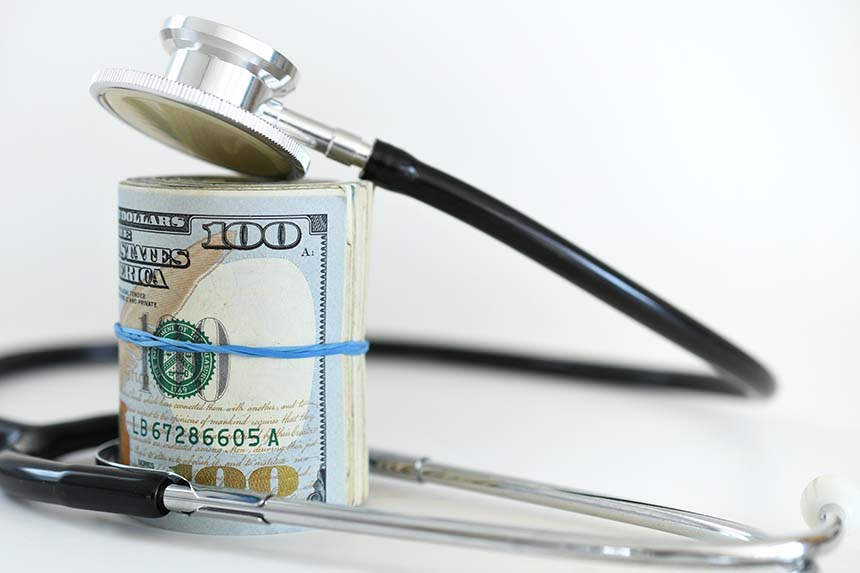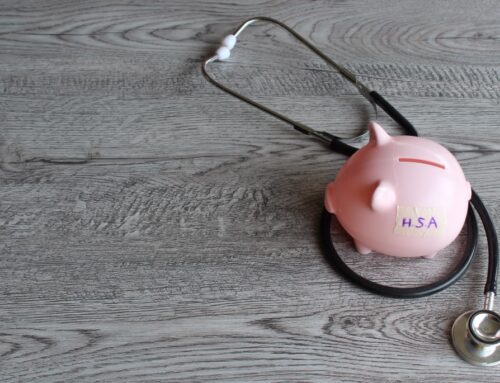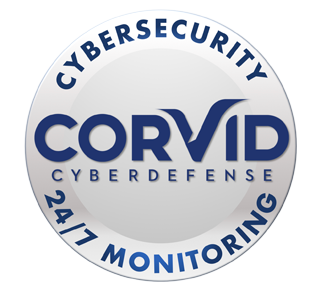 If you have a Health Savings Account (HSA) option, the benefits are worth the investment. The tax benefits of an HSA magnify the advantage of investing in, say, stock funds or diversified mutual funds. First, your contribution is tax-deductible. Second, once inside your HSA, your money grows tax-free. Third, when used for eligible healthcare costs, withdrawals are tax-free. Finally, you can keep the account even in retirement to pay for medical bills.
If you have a Health Savings Account (HSA) option, the benefits are worth the investment. The tax benefits of an HSA magnify the advantage of investing in, say, stock funds or diversified mutual funds. First, your contribution is tax-deductible. Second, once inside your HSA, your money grows tax-free. Third, when used for eligible healthcare costs, withdrawals are tax-free. Finally, you can keep the account even in retirement to pay for medical bills.
The average couple retiring today needs a whopping $280,000 to cover the cost of health care throughout their retirement. You need to plan for those future health costs. The truth is your HSA is more than just a regular old savings account. Your HSA investment options can help you save for doctor visits and prescriptions and add some extra tax-free cash to your retirement dreams.
An HSA is a tax-advantaged savings account paired with a high-deductible health plan (HDHP) that can help you pay for medical expenses—both now and in the future. Your HSA usually starts as a cash account, which earns interest like a savings account. But once you reach a certain balance, you can change your HSA into an investment account, which functions like an IRA.
- Lower monthly premiums help you save money.
Having an HSA-qualified, high-deductible health plan means you’ll pay less in monthly premiums than you would with a traditional health plan. The downside of a higher deductible is that you’ll need to pay more before your insurance kicks in.
- HSAs come with some fantastic tax benefits.
With an HSA, you can take advantage of not one, not two, but three incredible tax benefits that can help you save for medical expenses both now and in the future:
- You’re not taxed when you put money into your HSA.
- The money in your HSA grows tax-free.
- You’re not taxed when you take money out to pay for medical expenses.
BONUS: Your HSA can lower your tax bill by reducing your taxable income. For example, if you put $2,000 into an HSA in a year, you lower your taxable income by $2,000!
- You own your HSA, and it rolls over each year.
The great thing about an HSA is that it’s entirely yours. Those funds are yours to use for qualified expenses. Your HSA balance rolls over year-to-year, so you have access to all the money in the account.
You can invest your HSA funds, so they grow over the long term. When you turn 65, that HSA will act like a traditional IRA—you can take the money out for whatever you like, but you’ll have to pay taxes on it. On the flip side, at 65, you become eligible for Medicare coverage. Once you enroll in Medicare, you can’t contribute to your HSA anymore, but you can still use the money in your HSA tax-free for medical expenses. That makes using an HSA a perfect option for covering health costs in your retirement years.
It’s worth noting that having an HSA also means there’s no minimum distribution so you can keep the money in your HSA as long as you like.
According to Dave Ramsey, if your 401(k) and Roth IRA are the star players of your retirement plan, then the HSA is like the closer—a key teammate there to seal the deal and bring your team to victory. Preparing for medical and other expenses during retirement takes insight and expertise, and we’re here to help. Call us today at (540) 720-5656, and let’s see if we can optimize your HSA to help when you need it most.



















 Megan Jones joined the ILG Financial team in 2020 as marketing director. Megan and her husband live in Fredericksburg, VA with their German Short Haired Pointer, Gus. Megan is a graduate of Longwood University and holds a degree in communications. Megan is the oldest of Dave Lopez’s three children and not only enjoys working alongside her father, but also with her cousin, Chase, who joined the ILG Financial team in 2020 as an advisor. Megan is also a fully licensed Life, Health, and Annuity agent. When not at work, Megan enjoys sitting on the back porch with family and friends enjoying food and music.
Megan Jones joined the ILG Financial team in 2020 as marketing director. Megan and her husband live in Fredericksburg, VA with their German Short Haired Pointer, Gus. Megan is a graduate of Longwood University and holds a degree in communications. Megan is the oldest of Dave Lopez’s three children and not only enjoys working alongside her father, but also with her cousin, Chase, who joined the ILG Financial team in 2020 as an advisor. Megan is also a fully licensed Life, Health, and Annuity agent. When not at work, Megan enjoys sitting on the back porch with family and friends enjoying food and music. Chase Lopez joined the ILG Financial team in 2020 as an advisor. Chase is a 2016 James Madison University graduate with a degree in management. Chase has been trained under the tutelage of Dave Lopez, who is not only the founder and managing member of ILG Financial, but also is Chase’s uncle and godfather. He also enjoys working alongside his cousin, Megan, who is Dave’s daughter.
Chase Lopez joined the ILG Financial team in 2020 as an advisor. Chase is a 2016 James Madison University graduate with a degree in management. Chase has been trained under the tutelage of Dave Lopez, who is not only the founder and managing member of ILG Financial, but also is Chase’s uncle and godfather. He also enjoys working alongside his cousin, Megan, who is Dave’s daughter. Amy Anderson joined the ILG Financial team in 2023 as the client relations coordinator. Her responsibilities include scheduling of appointments, annual check-up notifications, and annuity and required minimum distribution assistance. She is a graduate of Harding University with a degree in Computer Information Systems. Amy and her husband have two children and she enjoys reading, crocheting, music and spending time with her family.
Amy Anderson joined the ILG Financial team in 2023 as the client relations coordinator. Her responsibilities include scheduling of appointments, annual check-up notifications, and annuity and required minimum distribution assistance. She is a graduate of Harding University with a degree in Computer Information Systems. Amy and her husband have two children and she enjoys reading, crocheting, music and spending time with her family. Jessica Carson joined the ILG Financial team in 2018 as an agent. Jessica and her husband have four children, two dogs, 3 barn cats, 5 chickens, and three parakeets. She indeed loves her children and pets! When not at work, Jessica enjoys playing the piano and cello as well as traveling and spending time outside with her family, hiking, fishing, and boating.
Jessica Carson joined the ILG Financial team in 2018 as an agent. Jessica and her husband have four children, two dogs, 3 barn cats, 5 chickens, and three parakeets. She indeed loves her children and pets! When not at work, Jessica enjoys playing the piano and cello as well as traveling and spending time outside with her family, hiking, fishing, and boating. Terri Center joined the ILG Financial team in 2019 as client services manager. She handles client records, application processing, and gathering information to provide a professional and friendly experience with all of our clients. Terri is a graduate of Oakland University. She is married and has two children. She enjoys hiking, family time, and puzzle challenging video games. She also likes to share her creativity in her canvas paintings and sewing projects.
Terri Center joined the ILG Financial team in 2019 as client services manager. She handles client records, application processing, and gathering information to provide a professional and friendly experience with all of our clients. Terri is a graduate of Oakland University. She is married and has two children. She enjoys hiking, family time, and puzzle challenging video games. She also likes to share her creativity in her canvas paintings and sewing projects.